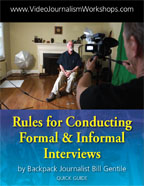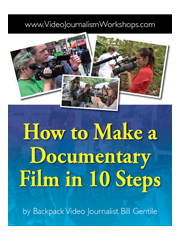Informal interviews are covered in Video #4 of the Video Journalism Workshop. We also see a practical example in Video #13, where I use informal interviews in my film “Afghanistan: The Forgotten War.”
I refer to my presence as I practice the craft as, “participatory observation.” My job is to observe and to document. But I have to participate to a certain degree because if I do not, then the characters I select will not tell their stories. I prefer, and I think the audience prefers, that my characters tell their own stories, as opposed to me telling their stories for them. So how do I selectively and strategically participate in the production? How do I get my characters to tell their stories? Here’s the answer: With interviews, both informal and formal. I will cover the formal interview in the next email. Here’s how I define the informal:
INFORMAL, or on-the-run, interview. In the online video course we study one of my films “Afghanistan: The Forgotten War,” in which I was embedded with U.S. Marines in Afghanistan. In the film, we see some good examples of the informal interview in action.
These are questions that I ask (at strategic moments so as not to interfere with the military operation) to get the Marines to tell their stories.
I call them my three “magic questions:”
- What are you doing?
- What are you going to do?
- What did you just do?
If you ask, and get answers, to these questions, your subjects will tell their own stories, and this is always more compelling than you telling their stories. Audiences prefer to hear the characters tell their stories as opposed to hearing you narrate the stories for them.
Here are some rules for the INFORMAL interview:
- Get subject to introduce him/herself as soon as possible.
- Engage your subjects. Elicit comments from them. Ask them the three magic questions:
- “What did you just do?” “What are you doing now?” “What are you going to do?”
- Make subjects speak in whole sentences. “Right now I’m working on …”
- Get your subjects to talk about each other. This develops and enhances character.
Click Here to Download “Conducting Formal_and_Informal_Interviews”.pdf
Thank you for visiting our site and hope these lessons on making video documentaries are helpful. We would love to hear your feedback and questions. If you would like to receive emails like this and our free pdf book Tip, Tools and Resources for Making Documentaries please subscribe in the upper right corner.
About the ONLINE Video Journalism Workshop Course?
Discover the secrets of creating powerful video documentaries in the ONLINE Video Journalism Workshop course. You’ll enjoy an intensive 14-part immersion in the craft of learning how to make documentaries.
The course on making video documentaries covers the gamut of the storytelling craft from the genesis and shaping of story ideas, to shooting powerful images that drive the story, to capturing and using sound. You learn about script writing, narration, and editing with portable computers and modern editing software. Please visit the Video Journalism Workshop home page for more details.
Connect with us on Facebook at ?https://www.facebook.com/VideoJournalismWorkshops


